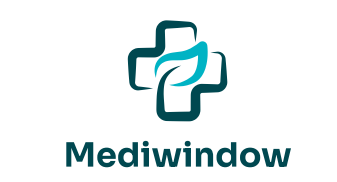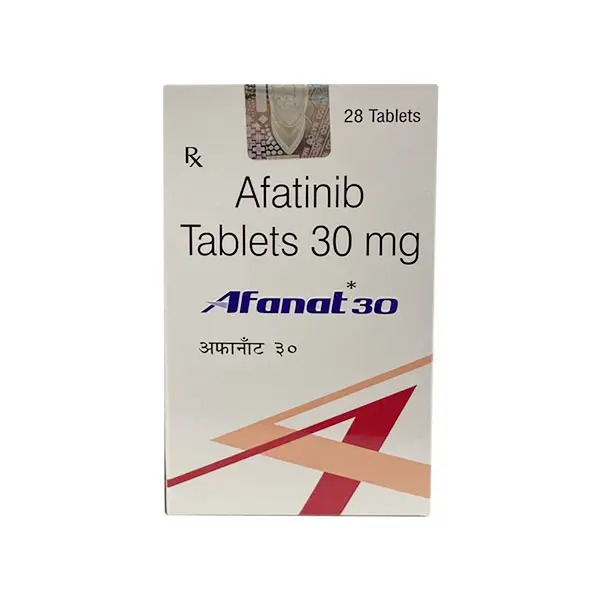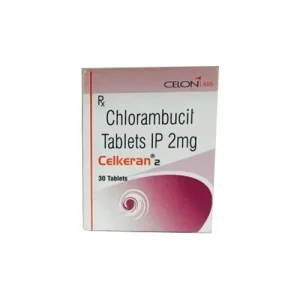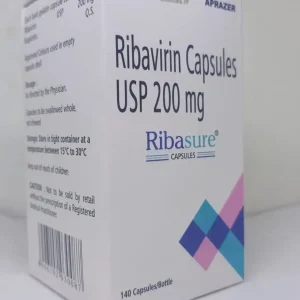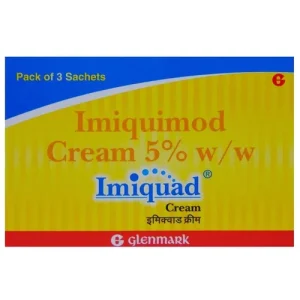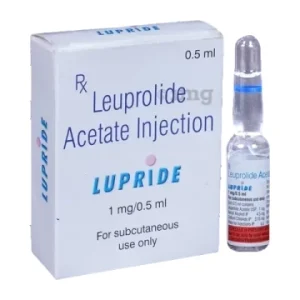Description
Afatinib 30 mg Tablets – Targeted Therapy for EGFR+ NSCLC
Afatinib 30 mg is an oral anticancer medication used to treat advanced or metastatic non-small cell lung cancer (NSCLC) in patients with specific EGFR gene mutations. It is a tyrosine kinase inhibitor (TKI) that works by blocking cancer-causing proteins that stimulate tumor growth. Afatinib is often prescribed as a first-line therapy for EGFR-positive patients.
Key Benefits:
- Effective against EGFR exon 19 deletions and exon 21 (L858R) mutations
- Oral once-daily tablet – no injections or infusions needed
- Improves progression-free survival in advanced NSCLC
- Used as part of precision oncology with molecular testing
- Alternative for patients who do not tolerate first-generation TKIs
How to Use:
Take Afatinib 30 mg orally once daily, on an empty stomach (at least 1 hour before or 2 hours after food). Swallow the tablet whole with water. Dosage adjustments may be required based on tolerance or side effects—follow your oncologist’s guidance closely.
Precautions:
- Do not use during pregnancy or breastfeeding without medical advice
- Inform your doctor about liver, kidney, or heart conditions
- May interact with other medications—disclose all drugs you take
- Frequent monitoring may be needed (skin, liver, lung function)
Storage Instructions:
Store at 15°C–30°C in a dry place. Keep away from moisture and direct sunlight. Keep out of reach of children.
Disclaimer:
This product is a prescription-only medication for cancer patients. It should only be used under the supervision of a certified oncologist. The content provided is for informational purposes only and is not a substitute for professional medical advice.
Frequently Asked Questions (FAQs)
1. What is Afatinib 30 mg used for?
Afatinib 30 mg is prescribed for treating metastatic NSCLC in patients with confirmed EGFR mutations, especially exon 19 deletions or exon 21 L858R substitutions.
2. How does Afatinib differ from chemotherapy?
Afatinib is a targeted therapy that specifically blocks EGFR-related pathways, unlike chemotherapy, which affects all rapidly dividing cells. It usually causes fewer systemic side effects.
3. Can I adjust the dose myself if I experience side effects?
No. Dose adjustments must only be done under the supervision of your oncologist. Never stop or modify your dosage without medical advice.
4. What are the side effects of Afatinib?
Common side effects include diarrhea, rash, dry skin, mouth sores, and nail infections. Severe side effects like liver issues or lung inflammation require immediate attention.
5. Is Afatinib 30 mg safe during pregnancy?
No, it may harm an unborn baby. Use effective birth control and consult your doctor if pregnant or planning to become pregnant.
6. How long do I need to take Afatinib?
Duration depends on your response to treatment and tolerance. Some patients continue for months or years. Treatment is usually stopped if the disease progresses or side effects become unmanageable.
7. Can Afatinib be combined with other treatments?
In some cases, Afatinib may be used before or after chemotherapy or radiation. Your oncologist will determine the best approach based on your cancer stage and mutation type.
